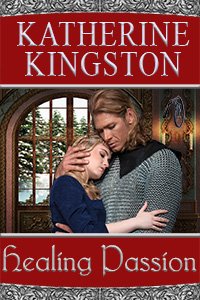There’s
always a risk when setting your story in a real historical background that you
can later find out events or people of the day might actually have a real
history that contradicts what you’re trying to do.
When
I wrote my Passions series of books back in the early years of this millennium
(and doesn’t that feel weird?), I did a lot of research on England in the
fourteenth century, including major events and the main historical characters
of importance. Because I’d studied Medieval literature fairly extensively in
college, I had a fair grasp of the events of the period, but I tried to double-check
details.
I
put a date on the first book in the series but not on the subsequent ones
because I didn’t want to be tied to a particular year. There was a lot going in 14th
century England and I didn’t want to have to account for everything that
might’ve happened in a year and how it would impact the characters and events.
For the most part I’ve steered clear of using actual historical events and
personages.
In
my most recent release, Healing Passion, however, there are references to
battle happening on the continent and a prince who is in charge. And there is a
scene toward the end where the hero and heroine go to court and meet the king
and prince. I don’t name the king, though
it’s not hard to figure out he’s meant to be Edward III, because I do allude to
the prince present with him as the Black Prince.
And
right there I take a couple of historical liberties. First of all Edward of Woodstock, later Prince
of Wales and Prince of Aquitaine, was not (as far as we know) ever referred to
as the Black Prince while he was alive. The first written use of that name for
him comes almost two centuries later. But I figured that there was likely a
tradition that gave him that sobriquet well before that, possibly even during
his lifetime.
The
second was that from a young age, Edward spent most of his time on the
continent, leading the English forces in what must have seemed like an unending
war. He was rarely in England until near
the time of his death and even then he spent most of that time at his own
estates, separate from the king’s.
If
you’re interested, I have more interesting facts about The Black Prince at my
website here:http://katherinekingston.com/playing-with-his…the-black-prince/
Meanwhile,
Healing Passion, the last of the Passions series of Medieval Historical Erotic
Romances is now available at all major outlets.
HEALING PASSION
Re-release date June 1, 2017
Genre: Medieval historical, domestic discipline, BDSM
Length: Novel
Order eBook from: Amazon B&N Kobo iTunes
More info
Re-release date June 1, 2017
Genre: Medieval historical, domestic discipline, BDSM
Length: Novel
Order eBook from: Amazon B&N Kobo iTunes
More info
The king has charged Sir Thomas Carlwick with learning what became of Baron Groswick. No one has seen or heard from the man for more than a year. Thomas’ inquiries have so far turned up no sign of the Baron. When he goes to Groswick Keep, he gets a mixed reception. Young, lovely Lady Juliana welcomes him graciously, but that evening someone tries to kill him by firing a crossbow at him. Juliana apologizes and tends his injury. She also tells him she has no idea what happened to her husband, but she’s beginning to accept that he’s dead.
Thomas is attracted to Juliana, finding in her everything he’s wanted in a woman. Despite a past that was nearly destroyed by a woman’s lies, Thomas is ready to settle down again, and he believes Juliana is exactly what he’s looking for. As soon as he can prove Baron Groswick is dead, Juliana will be free to marry him.
But he may not want her anymore when he learns what really happened to Baron Groswick.



Fascinating post, Kate. Historicals are so challenging to write when trying to get period details correct. Much success with this book! :)
ReplyDelete"But I figured that there was likely a tradition that gave him that sobriquet well before that, possibly even during his lifetime."
ReplyDeleteTHIS!! We historical writers get to imagine stuff like this!!